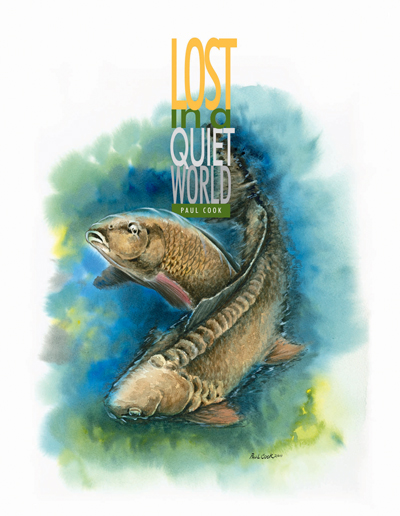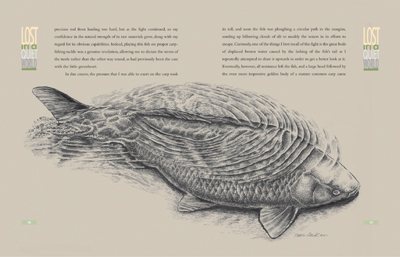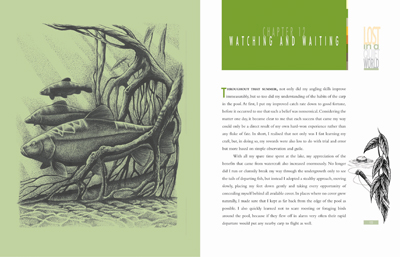Once again Stephen Harper of Harper Fine Angling Books has come up trumps and I’m genuinely greatful for the opportunity to feature an extract from another current book, LOST IN A QUIET WORLD by Paul Cook.
 Born in 1964 at Bushey in Hertfordshire, Paul Cook first came to angling as a young boy under the tutelage of his father on the banks of the Grand Union Canal. A gifted artist even from his earliest years, the resulting combination of fishing and a love of natural history soon became and remain still the perfect medium for his creative expression.
Born in 1964 at Bushey in Hertfordshire, Paul Cook first came to angling as a young boy under the tutelage of his father on the banks of the Grand Union Canal. A gifted artist even from his earliest years, the resulting combination of fishing and a love of natural history soon became and remain still the perfect medium for his creative expression.
Leaving Art College, where he studied Art and Design, to pursue a career in the world of bespoke glass engraving, Paul has since undertaken many prestigious engagements, including work for the Sultan of Brunei, film and television. Latterly he has expanded his business activities to incorporate his skills at hand-building traditional fishing tackle, as well as commissioned artwork, and the illustration of several angling books for various publishing houses.
Harking back to a time when carp fishing was still very much in its formative stages,
Lost In A Quiet World is an autobiographical account of childhood experience concerning one boy’s pursuit of this species at a mysterious and private estate lake. Through failure and success, the story as it unfolds takes the reader on a personal journey of discovery based on detailed accounts that were recorded in diary form.
Carefully re-drafted and lovingly illustrated by the author more than three decades later, the book not only serves as a charming reminder of the wonder that all anglers commonly share in the learning and understanding of their craft, but also offers an alternative, more gentle approach to the sport, far removed from the current rush for modernity and so-called progress.
PROLOGUE
The small boy is well hidden behind the screen of reeds. His mouth is dry and cramp is beginning to work its way into his immature limbs. Small beads of perspiration trickle down his face, and yet, as his heart beats faster at the building excitement, he somehow manages to contain
his eagerness.
A sharp cackle from a nearby crow startles him for a moment, but his concentration soon returns. Carefully he peers through the thin curtain of reeds, stretching himself as much as he dare. Yes, they are still there; three dark shapes holding station just under the surface of the warm water, quite unaware of their single audience.
With trembling hands the boy tears a piece of crust from a loaf of bread and pushes a hook between the soft folds of dough. Before casting out, however, he studies the scene again to make sure they have not moved. He is not disappointed. Slowly, gently he lobs the baited hook a short distance from the basking carp, to land on the pool with a muted plop, and with bated breath he settles himself to await events.
One fish, a female common carp and perhaps the largest of the group, responds in leisurely fashion, gliding over to investigate the white morsel held fast in the sticky film. The boy tenses as he tightens his grip around the handle of the little greenheart fishing rod. Upwards the fish comes, still closing on the sodden crust, her animal instincts all the while urging caution. Hunger, though, cannot be denied, and soon a cavernous mouth engulfs the appetising fragment.
As he sweeps the rod skywards, the aged greenheart arcs alarmingly over the boy’s head as the hook finds its home, and in that electrifying first moment of contact a huge plume of water erupts as the fish turns down and away from its unseen adversary. Using her full bulk, the fish bores powerfully, causing the little rod to buck and creak under the unforgiving pressure until, without warning, it springs straight once again. In an instant, no longer does the tightly-strung line sing to the pull of the great carp, but instead hangs limply in the air for the briefest of moments before settling weightless on the still-rocking water.
An eerie quiet falls around the lake as the now trembling boy stands both bewildered and exhilarated at the same time. Initial feelings of despair at the loss of such a prize slowly subside, to be replaced by an overwhelming mood of triumph as the realisation dawns on him that, after a number of unsuccessful attempts, he has at last succeeded in hooking – albeit briefly – one of the giants in the pool. And even in these, his formative years, he knows full well that no matter how brief the encounter these precious moments will never be forgotten.
The ripples on the pool have long since subsided to a familiar peaceful calm as the boy packs his tackle. With one final, backward glance over the water he sets off, heading for home, vowing to return.
Lost In A Quiet World is published by Harper Fine Angling Books in a limited edition (1,000 copies) cloth bound edition with dust jacket priced £30 plus £5 P&P. It contains many fine paintings and illustrations by the author within its 180 pages. The book is 245 x 190mm andfull colour throughout. A limited number of leather boundcopies (of 50) remain at the time of publishing this article priced at £195 plus £8 P&P. Full details can be found here.


